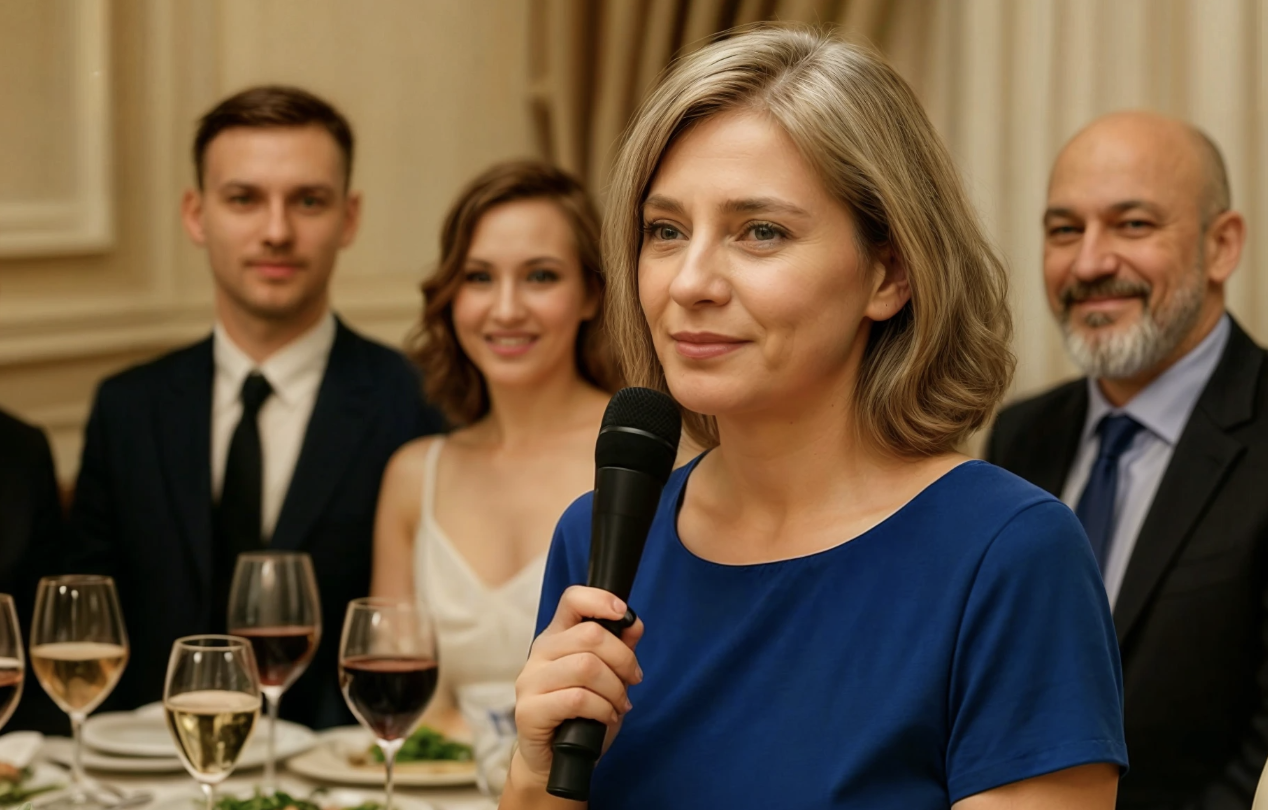Svetlana Petrovna stood in the doorway of the room, barely opening the door — so as not to disturb, but also not to miss an important moment. She looked at her son with the same gaze that mixed motherly pride, tenderness, and something almost sacred. Sashka stood before the mirror in a light suit with a bow tie, which his friends helped him fasten.
Everything looked like a scene from a movie — he was well-groomed, handsome, and calm. But inside Svetlana something clenched with pain: it seemed to her that she was superfluous in this scene, as if she did not exist in this life, as if she had not been invited at all.
She carefully adjusted the hem of her old dress, mentally imagining how it would look with the new jacket she had prepared for tomorrow — because she had already decided to go to the wedding, even without an invitation. But as soon as she took a step forward, Sashka, as if sensing her gaze, turned around, and his expression instantly changed. He came up, closed the door, and stayed in the room.
“Mom, we need to talk,” he said calmly but firmly.
Svetlana straightened. Her heart started pounding wildly.
“Of course, son. I… I bought those shoes, remember the ones I showed you? And also…”
“Mom,” he interrupted. “I don’t want you to come tomorrow.”
Svetlana froze. At first, she didn’t even realize the meaning of what was said, as if her mind refused to let the pain into her heart.
“Why?..” her voice trembled. “I… I…”
“Because it’s a wedding. Because there will be people there. Because you look… well… not quite right. And your job… Mom, understand, I don’t want people to think I’m from… some kind of low place.”
His words fell like icy rain. Svetlana tried to interrupt:
“I made an appointment with a stylist, they’ll do my hair, manicure… I have a dress, very modest, but…”
“Don’t,” he cut in again. “Don’t make it worse. You’ll stand out anyway. Please. Just don’t come.”
He left without waiting for an answer. Svetlana remained alone in the dim room. Silence enveloped her like cotton. Everything became muffled — even her breathing, even the ticking of the clock.
She sat motionless for a long time. Then, as if pushed by something inside, she got up, took an old dusty box from the closet, opened it, and pulled out an album. It smelled of newsprint, glue, and forgotten days.
On the first page was a yellowed photograph: a little girl in a wrinkled dress standing next to a woman holding a bottle. Svetlana remembered that day — her mother was yelling at the photographer, then at her, then at passersby. A month later she was deprived of parental rights. That’s how Svetlana ended up in an orphanage.
Page after page hit her like blows. A group photo: children in identical clothes, without smiles. A stern-faced caretaker. It was then she first understood what it meant to be unwanted. She was beaten, punished, left without dinner. But she did not cry. Only the weak cried. And the weak were not spared.
The next section — youth. After graduation, she worked as a waitress in a roadside café. It was hard, but no longer scary. She gained freedom — and that was exhilarating. She became neat, started choosing clothes, sewing skirts from cheap fabrics, curling her hair in the old-fashioned way. At night, she learned to walk in heels — just to feel beautiful.
Then — an accident. There was a commotion in the café. She accidentally spilled tomato juice on a customer. Panic, shouting, the manager fiercely demanded explanations. She tried to explain, but everyone was angry. Then Victor — tall, calm, in a light shirt — suddenly smiled and said:
“It’s just juice. An accident. Let the girl work in peace.”
Svetlana was stunned. No one had ever spoken to her like that. Her hands trembled as she took the keys.
The next day he brought flowers. Just placed them on the counter and said, “I want to invite you for coffee. No strings attached.” He smiled in a way that made her feel, for the first time in many years, not like “a waitress from the orphanage,” but like a woman.
They sat on a bench in the park, drinking coffee from plastic cups. He talked about books, travels. She — about the orphanage, dreams, about nights when she had a family in her dreams.
When he took her hand, she couldn’t believe it. Her world seemed to change: in that touch there was more tenderness than in her entire life. Since then, she waited for him. And every time he appeared — in the same shirt, with the same eyes — she forgot what pain was. She was ashamed of her poverty, but he seemed not to notice. He said: “You’re beautiful. Just be yourself.”
And she believed him.
That summer was surprisingly warm and long. Svetlana later remembered it as the brightest period of her life — a chapter written with love and hope. Together with Victor, they went to the river, walked in the forest, talked for hours in small cafés. He introduced her to his friends — smart, cheerful, educated. At first she felt awkward, an outsider, but Victor squeezed her hand under the table — and that gesture gave her strength.
They watched sunsets on the roof of a house, brought tea in a thermos, wrapped in a blanket. Victor shared dreams of working for an international company but said he did not want to leave the country forever. Svetlana listened, holding her breath, memorizing every word, because she felt: it was all so fragile.
One day he asked her — jokingly, but with some seriousness — how she would feel about a wedding. She laughed, hiding her embarrassment, and looked away. But inside a fire ignited: yes, yes, a thousand times yes. She was just afraid to say it aloud — afraid to scare away the fairy tale.
But the fairy tale was scared off by others.
They were sitting in the very café where Svetlana once worked when it all started. At the next table someone laughed loudly, then a slap, and a cocktail flew into Svetlana’s face. The liquid ran down her cheeks and dress. Victor jumped up, but it was too late.
At the next table sat his cousin. Her voice full of anger and disgust:
“Is this her? Your chosen one? A cleaner? From the orphanage? Is that what you call love?”
People looked. Someone laughed. Svetlana didn’t cry. She just got up, wiped her face with a napkin, and left.
And from that moment, the real pressure began. The phone rang constantly with angry whispers, threats. “Leave before it gets worse.” “We’ll tell everyone who you are.” “You still have a chance to disappear.”
Provocations began: she was slandered to neighbors, rumors spread that she was a thief, prostitute, drug addict. Once an old neighbor — Yakov Ivanovich — came to her and said people had offered him money to sign a paper claiming he saw her taking something out of the apartment. He refused.
“You’re good,” he said. “And they’re scoundrels. Hang in there.”
She hung in there. She told Victor nothing — didn’t want to spoil his life before he left abroad: he was going for an internship in Europe. She just waited for it all to pass, for them to survive.
But not everything depended on her.
Shortly before departure, Victor got a call from his father. Nikolai Borisovich Sidorov, the city mayor, a powerful and tough man, summoned Svetlana to his office.
She came. Modestly, but cleanly dressed. Sat opposite, straightened up as if in court. He looked at her like dust beneath his feet.
“You don’t understand who you’re messing with,” he said. “My son is the future of this family. And you are a stain on his reputation. Leave. Or I will make sure you leave. Forever.”
Svetlana clenched her hands on her knees.
“I love him,” she said quietly. “And he loves me.”
“Love?” Sidorov snorted with contempt. “Love is a luxury for equals. And you are not equal.”
She didn’t break. Left with her head held high. Said nothing to Victor. Believed love would win. But on the day of departure, he flew away without knowing the truth.
A week later the café owner — Stas — called her. Dry, always displeased. Claimed goods were missing and said someone saw her taking something from the storeroom. Svetlana didn’t understand anything. Then the police came. An investigation began. Stas pointed at her. Others were silent. Those who knew the truth were afraid.
The state-appointed lawyer was young, exhausted, indifferent. In court he spoke weakly. Evidence was unreliable, sewn with white thread. Cameras showed nothing, but the testimony of “witnesses” was more convincing. The mayor put pressure. The verdict — three years in a general regime penal colony.
When the cell door slammed behind her, Svetlana realized: that was it. Everything that was — love, hopes, future — remained behind bars.
Then, a few weeks later, she began to feel nauseous. She went to the infirmary, took a test. Result — positive.
Pregnant. By Victor.
At first, she couldn’t breathe from the pain. Then silence came. Then a decision. She would survive. For the child.
Being pregnant in a colony was hell. She was teased, humiliated, but she kept silent. She stroked her belly, talked to the baby at night. Thought about names — Sashka. Alexander. After the patron saint. For a new life.
The birth was difficult, but the baby was healthy. When she first held her son, she cried. Quietly, silently. It wasn’t despair. It was hope.
Two women helped her in the colony — one for murder, another for theft. Rough, but respectful to the baby. They taught her, guided her, swaddled him. Svetlana held on.
After a year and a half, she was released on parole. Yakov Ivanovich waited for her outside. Holding an old baby blanket.
“Here,” he said. “They gave it to us. Come, a new life awaits you.”
Sashka slept in the stroller, clutching a plush teddy bear tightly.
She didn’t know how to thank him. Didn’t know where to start. But she had to — from day one.
Mornings started at six: Sashka to nursery, she to the office to clean. Then the car wash, evening — a part-time job at a warehouse. At night — sewing machine, threads, fabrics. She made everything: napkins, aprons, pillowcases. Day followed night, night — day, and all blurred into a fog. Her body ached, but she went on, like clockwork.
One day on the street she met Larisa — the same girl from the kiosk near the café. She froze seeing Svetlana:
“Oh God… Is that you? Alive?”
“And what was supposed to happen?” Svetlana asked calmly.
“Sorry… So many years… Listen, do you know Stas went bankrupt? Completely. He was kicked out of the café. And the mayor… he’s in Moscow now. And Victor… Victor got married. Long ago. But, they say, unhappily. Drinks.”
Svetlana listened as if through glass. Something pricked inside. But she just nodded:
“Thanks. Good luck to you.”
And walked on. No tears, no hysteria. Only that night, after putting her son to bed and sitting in the kitchen, she allowed herself one thing — to cry. No sobbing, no moaning — just let out the silent pain from her eyes. And in the morning got up again — and went on.
Sashka grew. Svetlana tried to give him everything. First toys, a bright jacket, tasty food, a good backpack. When he was sick, she stayed by his bedside, whispered fairy tales, put on compresses. When he fell and scraped his knee, she rushed from the car wash, covered in foam, scolding herself — why didn’t she watch better. When he asked for a tablet, she sold her only gold ring — a memory of the past.
“Mom, why don’t you have a phone like everyone else?” he asked one day.
“Because I have you, Sashunya,” she smiled. “You’re my most important call.”
He got used to everything appearing easily. That mom was always near, always smiling. Svetlana hid her fatigue as best she could. Didn’t complain. Didn’t allow herself weakness. Even when she wanted to fall and never get up.
Sashka grew up. Became confident, charismatic. Did well in school, had many friends. But more and more often he said:
“Mom, buy yourself something already. You can’t always wear those… rags.”
Svetlana smiled:
“Okay, son, I’ll try.”
But in her heart, it ached: could it be that even he… was like everyone else?
When he told her he was going to get married, she hugged him with tears:
“Sashunya, how glad I am… I will definitely sew you a snow-white shirt, okay?”
He nodded, as if he didn’t hear.
Then came that conversation. The one that broke everything inside her. “You’re a cleaner. You’re a disgrace.” Those words — like blades. She sat long before the photo of little Sashka — in blue crawlers, smiling, reaching out his hand to her.
“You know, baby,” she whispered, “I am everything to you. Everything. I lived only for you. But maybe it’s time to live for myself too.”
Svetlana got up, went to the old tin box where she saved money “for a rainy day.” Counted the money. Enough. Not for luxury, but for a good dress, a hairdresser, and even a manicure. She booked a salon on the outskirts, chose modest makeup, a neat hairstyle. Bought an elegant blue dress — simple, but perfectly fitting.
On the wedding day, she stood before the mirror for a long time. Her face was different. Not the exhausted woman from the car wash, but a woman with a story. She looked — and couldn’t believe it. Even put on lipstick — for the first time in many years.
“Sashunya,” she whispered, “today you will see me as I was. The one who was once loved.”
At the registry office, when she appeared, everyone turned around. Women scrutinized, men glanced secretly. She walked slowly, with a straight back, a slight smile. In her eyes — no reproach, no fear.
Sashka didn’t notice her immediately. When he recognized her — he turned pale. Approached, hissed:
“I told you not to come!”
Svetlana leaned toward him:
“I didn’t come for you. I came for myself. And I already saw everything.”
She smiled at Dasha. She blushed but nodded. Svetlana sat aside, didn’t interfere, just watched. And when Sashka caught her gaze, she realized — he saw her. For the first time in a long time — as a woman, not a shadow. And that was the main thing.
The restaurant was noisy, bright, glasses clinking, chandeliers sparkling. But Svetlana seemed in another reality. She wore that very blue dress, styled hair, calm eyes. She did not seek attention, proved nothing to anyone. Her inner silence was louder than any celebration.
Next to her was Dasha, sincere, open, with a warm smile. In her gaze there was no contempt — only interest and maybe admiration.
“You are so beautiful,” she said gently. “Thank you for coming. Really, I’m very glad to see you.”
Svetlana smiled:
“It’s your day, girl. Happiness to you. And… patience.”
Dasha’s father, respectful, with confident posture, approached and politely said:
“Join us. We’d be glad. Please.”
Sashka watched as his mother nodded with dignity and followed him without a word of reproach. He didn’t manage to object. Everything went by itself — mother was already beyond his control.
Then came the toasts. Guests stood up, joked, recalled stories. Then silence fell. And Svetlana stood up.
“If I may,” she said quietly, “I’d like to say a few words too.”
Everyone turned to her. Sashka tensed. She took the microphone as if she had done it before, and spoke calmly:
“I won’t say much. I just want to wish you love. The kind that holds you when you have no strength left. That doesn’t ask who you are or where you come from. That simply is. Take care of each other. Always.”
She didn’t cry. But her voice trembled. The hall froze. Then applause. Sincere. Genuine.
Svetlana returned to her seat, lowering her eyes. And at that moment someone approached. A shadow fell on the tablecloth. She looked up — and saw Him.
Victor. Grayed, but with the same eyes. The same voice:
“Svet… Is it really you?”
She stood up. Her breath caught, but she didn’t allow herself a sigh or tears.
“You…”
“I don’t even know… what to say. I… thought you… disappeared.”
“And you got married,” she said calmly.
“I was told you ran away. That you were with someone else. Sorry. I was a fool. I searched. But my father… he did everything to make me believe.”
They stood in the middle of the hall, as if everyone else disappeared. Victor held out his hand:
“Let’s go. Talk?”
They went into the corridor. Svetlana did not tremble. She was no longer that girl who was humiliated. Now — she was different.
“I gave birth,” she said. “In prison. From you. And raised him. Without you.”
Victor closed his eyes. Something inside tore.
“Where is he?”
“There. In the hall. At the wedding.”
He turned pale.
“Sashka?”
“Yes. That’s our son.”
Silence. Only her heels on the marble floor and the distant sound of music.
“I have to see him. Talk,” he said.
Svetlana shook her head:
“He’s not ready. But he will see. Everything. I hold no grudge. Just… now everything is different.”
They returned. Victor invited her to dance. A waltz. Light as air. And there they twirled in the center, everyone watching. Sashka froze. Who was this man? Why was mom like a queen? Why was everyone looking not at him, but at her?
He felt something breaking inside. For the first time in his life he felt ashamed. For words, for indifference, for years of ignorance.
When the dance ended, he approached:
“Mom… Wait… Who is this?”
She looked into his eyes. Smiled calmly, sadly, and proudly at once.
“That’s Victor. Your father.”
Sashka froze. Everything became muffled, as if underwater. He looked at Victor, then back at his mother.
“You… you’re serious?”
“Very.”
Victor stepped forward:
“Hi, Sashka. I’m Victor.”
Silence. No one said a word. Only eyes. Only truth.
“We three,” said Svetlana, “will have a lot to talk about.”
And they went. Not loudly, not solemnly. Just — the three of them. A new life began. Without the past. But with truth. And, perhaps, with forgiveness.



